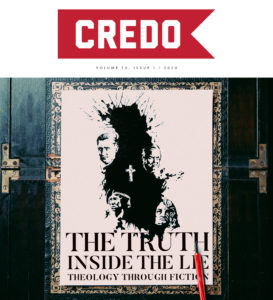Why would a NT Scholar write historical fiction? This is a fair question, and in my case some of it has to do with my background as an English literature major at UNC. But practically speaking there is a very different reason why I have been at this for over a decade. I learned later in life that you can squeeze more biblical thought and history and theology into people through historical fiction than through the usual NT textbooks. I am thinking particularly of lay people. Most of them simply do not read scholarly monographs or commentaries on the Greek NT. In fact, many pastors hardly do that kind of reading either. So how does one reach the educated lay person hungry for more understanding of the Bible? One, though not by any means the only, means is by writing things that both educate and entertain or give pleasure, as the ancient rhetoricians once said.
The Power of Stories
There is another important factor in play, namely psychologists tell us that story, narrative, is how people make sense of reality. It’s how they put the pieces together and figure out the meaning, the purpose, the direction of life, or even why it has meaning at all. Particularly it helps people reflect on what God’s story has to do with our various human stories. Historical novels dealing with biblical subjects and persons help in this process of discernment. Life has a plot, it involves a direction, one is born, one lives, one dies, but what is the meaning of such a life? What gives it purpose? Stories help people figure these things out, and perhaps especially it helps Christians do so. Life has a plot, it involves a direction, one is born, one lives, one dies, but what is the meaning of such a life? What gives it purpose? Stories help people figure these things out, and perhaps especially it helps Christians do so. Share on X
Accordingly, I first set out to write a series of archaeological thrillers for Cascade, the Art West series beginning with the Lazarus Effect (and followed by six more novels). This was targeted at the lay person interested in actual biblical archaeology as it is done in the various lands of the Bible. While the main characters, one evangelical Christian named Art West, one Jewish scholar named Grace Levine, one Sufi Muslim antiquities dealer named Kahlil el Said, are from different monotheistic faiths, they are nonetheless good friends and work together. I wanted to show that such inter-faith friendships could happen and be fruitful, as a prompt for discussing such issues today.
At the same time, I did a historical novel of sorts called The Gospel of Jesus (Seedbed, 2014). This one is less novel and more history as I try to piece together a coherent picture of the life of Jesus from the four Gospels with a minimum of filling in the gaps. This one has a good ministry with all sorts of people, including non-Christians who are nonetheless interested in who Jesus was and how he viewed himself.
Over delicious chili slaw dogs at the Varsity in Atlanta, Dan Reid, then my editor at Inter-Varsity Press, cooked up a series of historical novels under the A Week in the Life of…. title. The first one, A Week in the Life of Corinth (IVP Academic, 2012), has gone through many printings and has been used in Christian colleges and elsewhere as a palatable way of getting folks into the biblical text and the life of Paul. It deals with the week that Paul was on trial in Corinth, but it deals with much more than the trial. It depicts early Christian house church life, from what we can deduce from the sources.
Later I did a volume in the same series entitled A Week in the Fall of Jerusalem (IVP Academic, 2017), largely dealing with the Christian women who escaped the city during the week it fell to Titus in A.D. 70. History comes alive when you fill in the larger picture and give a sense of how the facts matter. And perhaps here is a good time to add, that there is precedent in the Gospels for doing fiction as a vehicle for conveying theology and ethics. I am referring of course to Jesus’s parables.
The notion that somehow fiction should be seen as inappropriate for those who believe in the historical substance of the NT is a view Jesus himself would not endorse. It is not antithetical to history, indeed fiction can be the best vehicle for helping one understand history. For example, the novels of Robert Harris on ancient Rome, particularly his celebrated novel on Pompeii not merely brings history to light and to life, it makes it understandable, and shows its real importance. Fiction can be the best vehicle for helping one understand history. Share on X
Most recently I have increasingly realized that the stories of early Christian women have been underplayed and under-appreciated, hence my most recent historical novel for Inter-Varsity entitled Priscilla: An Early Christian Life (IVP Academic, 2019). In this novel, Priscilla recounts the whole of the early Christian story from Pentecost until the persecutions in the 90s by Domitian. She was after all, an eyewitness to much of it in Corinth, Ephesus, Rome and elsewhere. And I am currently finishing a novel entitled Paul of Arabia, reflecting on what Paul might have been doing for three years in Nabatea after his conversion. Petra was the capital of that kingdom, and that is likely where Paul went for three years. But what would that have been like while he tried to find his voice in regard to sharing the Gospel with non-Jews? Inquiring minds want to know.
A Task Worth Pursuing
Why is it important that some biblical scholars undertake such tasks now? Certainly one reason is that the culture is becoming less Christian in the past few decades, and people in general are becoming less and less inclined to simply pick up a Bible or a reference book on the Bible and read it. But they will read novels. It is interesting that the vast majority of readers of Christian novels are women. This does not surprise me. They find it a good point of entry into all sorts of daunting subjects relating to the faith, and novels make it easy.
One of the features of the Week in the Life series and my subsequent novels has been having Closer Look sections in them, as well as the narrative itself, so that those who want more details about the historical context can have it, but those who don’t can simply skip to the next bit of narrative and carry on with reading the story. Lots of the feedback to these novels has been that this approach was helpful. The curious didn’t have to go get a Bible Dictionary to figure out, for instance, who was the judge in Paul’s trial in Corinth, but could carry on reading. I have long believed that if one wants to win some for Christ, one needs to be winsome, and historical fiction is a non-threatening way of attracting people to the Gospel. Share on X
I have long believed that if one wants to win some for Christ, one needs to be winsome, and historical fiction is a non-threatening way of attracting people to the Gospel. I have noticed of course that in the age of twittering and tweeting, that in general an age of sound bites, my students’ attention spans have gotten shorter and shorter. Taking this into account, I have chosen to write novellas rather than huge novels like Tolstoy’s War and Peace or Victor Hugo’s Les Miserables. Most people don’t read such tomes anymore, but a story you could read in an afternoon is a different matter entirely. It can peak one’s interest in the subject.
Of course, it is true that to be a novelist, one has to have a good command of the English language, as well as of one’s subject matter. Sadly, so many of my students have never been taught how to properly use the English language. They never learned proper grammar or syntax or the use of vocabulary. So a second order reason I have for writing novels is to help people become better writers themselves. You do, to some real extent, absorb the style and substance of proper writing by reading good literature of various sorts. I could of course say much more about this matter, but this should be enough for starting a conversation.


